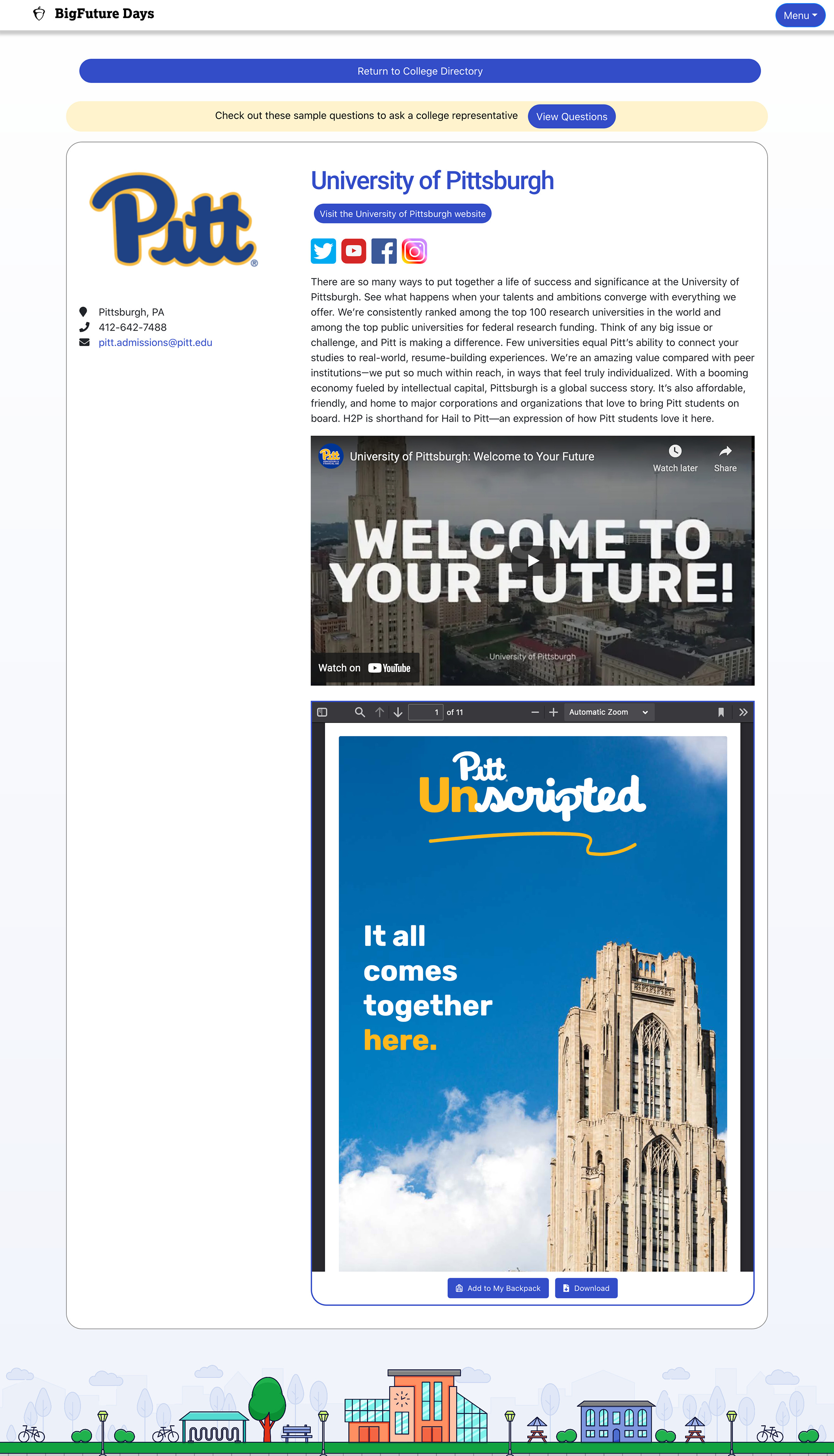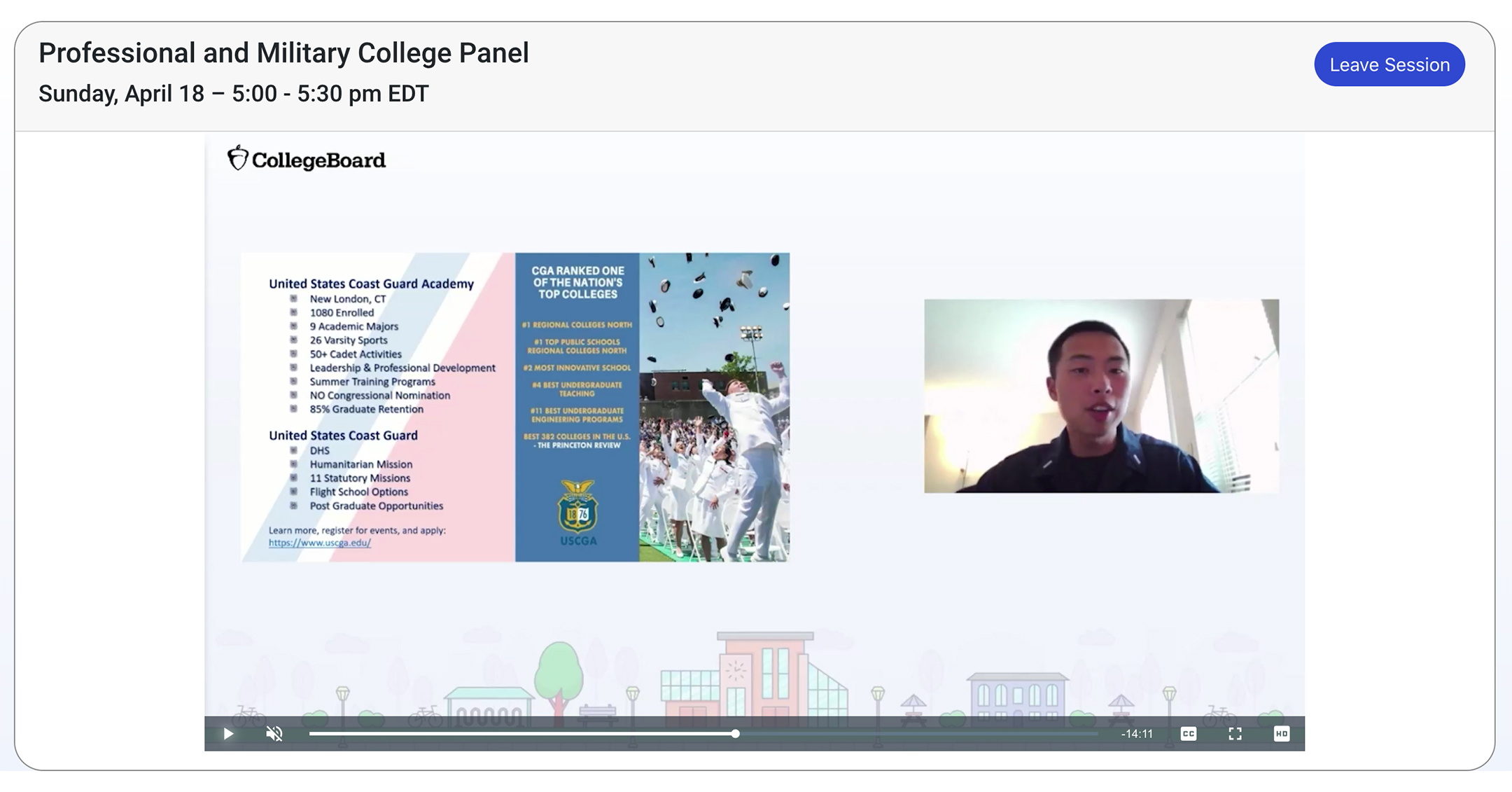
News
The Real Value of Virtual College Fairs
Events like BigFuture Days connects students with colleges and universities at a time when all other means of exploring schools is blocked by pandemic restrictions
Nearly every part of the student experience has been upended since the pandemic put much of “normal” life on pause in March 2020. But for young people considering what comes after high school, the challenges extend beyond remote schooling and limited social contact with their friends. They have also had to make big decisions about their futures through tiny screens.
With campus tours mostly off limits for the past year and college recruiters unable to visit high schools and financial aid workshops in person, online college fairs have become one of the only places where students can “meet” and talk with admissions representatives from a variety of schools. There’s no swag to take home—no branded water bottles or sweatshirts, no cellphone cases or USB drives bedecked with college logos—but these virtual experiences still manage to cram most of the essentials into the digital space. Events like BigFuture Days, which have taken place since early March, have given students the chance to visit “booths” to learn about colleges and chat live with admissions officers and college advisors.
“Students may not be able to visit a campus in person, but this is a great way to demonstrate interest, to start those conversations with colleges,” said Hannah Williams, a virtual advisor for the College Advising Corps who hosted a question-and-answer session during BigFuture Days. “Talk to anyone and everyone that you can!”

Mark Coplan's Berkeley Public School Photos/Flickr
This is what we usually think of when we hear "college fair." But the pandemic has scrapped events like this one, from 2016. Virtual college fairs have emerged as a way to give students crucial information they need to discover and research schools.
There have been three BigFuture Day college fairs this spring; the final one will be held on April 29. For the events, the College Board organized colleges by region and invited tens of thousands of students to participate in live discussion panels, chats with advisors and admissions reps, and sessions with current college students. Schools from across the higher education spectrum have been represented—public and private, community and highly selective—and students could navigate to college booths—sections of the online event dedicated to a particular school—to learn more about the institution and talk with representatives from the school.
“I’m a first-generation, low-income student, so I knew I’d have to look for resources wherever I could get them,” said Melissa, a sophomore at Columbia University who participated in a BigFuture virtual panel of current students. “I was really into looking at virtual college tours because I didn’t have much money to fly out and look into all the universities I possibly was attending. I think that’s very useful… especially during pandemic times, looking at virtual college tours and virtual resources you can get from home.”
As part of her Advising Corps work, Williams speaks regularly to high schoolers all over the country about college options. She said the pandemic has unquestionably impacted plans, with many students more interested in staying close to home. “Their college lists look different than they might have before the pandemic,” Williams tells The Elective. “A lot of students are really taking into account what their family responsibilities are, what would happen if they needed to get home quickly.”

BigFuture/College Board
An example of a virtual college booth, this hosted by the University of Pittsburgh during the northeast event on March 7 and currently archived online. During the live event, there is also chat for students to interact with representatives from schools.
Williams uses a variety of tools for virtual outreach, from Google Voice to texting and social media. She tries to be flexible so students can get answers in whatever way is most comfortable for them. “Every day, we’re learning how we can do better in communicating with students and supporting them,” she said. “They’ve really gotten used to virtual platforms, to connecting that way.”
Finding new ways to connect is crucial for admissions officials. College enrollment nationwide fell in Fall 2020 as students paused their plans or reconsidered college altogether. Much of that drop was at community colleges, but many four-year schools—especially those serving low-income and first-generation students—saw declines in freshman enrollment. With the ongoing disruption to K-12 schools during the 2020-21 academic year, admissions officials are worried about keeping students on track for the coming fall.

BigFuture/College Board
An example of a college planning panel, this one hosted during the BigFuture Day Midwest event on April 18 and currently archived online. During the live event, there is also a chat for students to interact with panelists.
Listening to the BigFuture sessions offered a window into how students weigh their college choices. The questions ranged from logistical (can I have two majors?) to existential (what should I do with my life?), reflecting just how complex college decisions can be.
“Building identity of all types requires serious self-reflection, which is an incredibly hard thing to do and even harder to do well—especially in high school,” said Andrew Buher, founder of the nonprofit Opportunity Labs, during a session titled “How to Pick a Career Path (That Actually Fits You).” He told his personal story of dropping out of college for lack of motivation, and drifting for a while without a clear sense of direction. “Don’t do what I did!” he said. “There’s a better path, a better option, one that’s driven by learning about yourself.”
One way of doing that, Buher suggested, was Roadtrip Nation, which helps students explore careers and see where different majors might lead. (The College Board has a longstanding partnership with RoadTrip Nation.) “It’s another really powerful resource for putting some of these ideas about career identity into action,” Buher said.

COD Newsroom/Flickr
Will we ever go back to the old way of doing college fairs? Definitely. But the success of virtual fairs means they're likely to stick around, too.
Creating a one-stop shop for all of those resources was the driving idea behind BigFuture Days, said Tierney Kraft, senior director of college and career access at the College Board. “There are so many different things that motivate students toward college,” she said. “Academic interests, career goals, financial considerations—we wanted to speak to all of those things, as best we can, in a virtual event.”
BigFuture Days, and online college fairs like it, was a response to a need created by the once-in-a-lifetime challenge of the pandemic. The last event of the year is looming, but it may not be the end of the program. Even after pandemic restrictions are lifted, there will likely be another round of virtual fairs.
“I think it’s enormously helpful for students to have access to this kind of information,” Kraft said, “wherever they are, whenever they need it.”
The final BigFuture Days virtual college fair of the spring is April 29. Register on the BigFuture website, where you can also access an archive of previous sessions.


